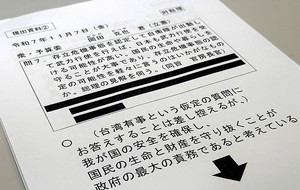April 4, 2025 at 15:48 JST
 President Donald Trump holds a signed executive order during an event to announce new tariffs in the Rose Garden of the White House on April 2 in Washington. (AP Photo)
President Donald Trump holds a signed executive order during an event to announce new tariffs in the Rose Garden of the White House on April 2 in Washington. (AP Photo)
If a major nation selfishly slams shut the door of trade, there will be no way to stop a chain reaction in which all nations move to act in their own interest.
A barbaric act has occurred that outright dismisses a mistake in history.
U.S. President Donald Trump announced his reciprocal tariffs, imposing an across-the-board tariff on products from almost all nations and regions as well as placing higher tariff rates on many nations that were unilaterally calculated.
An emergency situation has emerged in which an action of the foremost superpower could lead to the collapse of the trade system.
The shock of having the United States, which has shouldered the role of stabilizing the international community after World War II, move toward destroying that very order is huge.
Other nations will naturally deepen their opposition and confusion over this self-righteous act by the United States. Even so, there will be no victors if the response by those nations leads to a trade war.
Japan, Europe and other major nations must calmly but firmly encourage the Trump administration to reconsider its action. Those nations must also strengthen cooperation to prevent the spread of protectionism.
CRISIS FOR FREE TRADE STRUCTURE
In announcing the reciprocal tariffs, Trump said the move would make the United States prosperous again and called it “liberation day.”
Ever since his inauguration, Trump has repeatedly strengthened tariffs on certain nations in an arbitrary manner and the 25-percent tariff on automobiles has just begun.
The latest reciprocal tariffs will impose an across-the-board 10-percent tariff in addition to even higher tariff rates for about 60 nations and regions that were placed on a list.
Those higher tariffs were said to have been calculated by evaluating the nontariff barriers of those nations and Trump said he had halved the rates because he was warm-hearted. But no specific rationale was presented for the rates.
Trump claims that the tariffs will help to resuscitate American industry, but in fact Americans will be unable to avoid a burden increase. There are strong concerns inflation may be reignited as the cost of imports rise.
One estimate calculates that the economic growth rate could be pushed down by more than 2 percent if retaliatory measures are taken into consideration. Some have pointed to the possibility that the U.S. economy was headed toward negative growth.
The ramifications for the world economy are more dire. China and the European Union have already come out with retaliatory measures, increasing the risk that global economic growth will be curbed through the sharp decline in trade volume.
The United States has also temporarily suspended its contribution to the World Trade Organization, which had been seeking to set common international rules, and there are concerns of a further hollowing out of that organization.
The workings of the international community to expand the overall economic pie through active trade so that nations can mutually enjoy the gains have been forced into a crisis.
HIGH TARIFF RATES ECHO GREAT DEPRESSION
Based on the tariff rates announced by Trump, the average tariff rate to be imposed by the United States has been calculated to be about 20 percent, the level of the 1920s and 1930s when the entire world was in a depression.
Reflecting back on that time, after the collapse of the U.S. stock market and its strengthened tariffs, various nations became more protectionist, with Britain imposing an across-the-board 10-percent tariff. The spread of economic nationalism and creation of economic blocs led to World War II.
The lessons of the 20th century should be taken to heart, especially now when international security has been shaken by fighting in various parts of the world, such as Ukraine and Gaza.
It was Trump himself who said the world was on the brink of a third world war. While explaining a sense of crisis about such a possibility, he has also said and acted in a way to further divide the world by claiming the United States has been the victim of plundering on the part of both enemies and allies.
Those words and actions can only be described as irresponsible.
In addition to the economic loss that will hit both the United States and other nations through the introduction of the tariffs, there is also the high possibility that the diplomatic prestige of a hegemony will further decrease.
Trump has said that the EU was created to exploit the United States and that allies were worse than enemies when it came to trade. Such an understanding will certainly damage the U.S. relationship with allies and friendly nations.
By specifically calling out Vietnam and India among non-aligned nations, a deep shadow will be cast over the U.S. relationship with newly emerging and developing nations of the so-called Global South group.
AVOIDING RETALIATORY CHAIN REACTION
Cordell Hull, the former U.S. secretary of state who worked tirelessly for the creation of the United Nations after World War II, criticized the economic isolationism taken by the United States before the war and said that high tariffs would not bring prosperity.
Unfortunately, the United States of today appears to have lost sight of the significance of that legacy.
Japan was also named as one nation on the U.S. list and will be hit with tariffs of 24 percent.
Because the United States is the largest export market, the damage to Japan will be huge and will likely hurt the economic growth rate.
The government must take every measure to provide financial support for small and midsize businesses that will be most severely affected.
At the same time, the administration of Prime Minister Shigeru Ishiba must persistently continue to correct the irrational arguments made by the United States regarding Japan’s automobile market and rice tariffs.
Looking over the responses of the international community, while there are some nations that have come out with retaliatory measures, there are others that are trying to cautiously discern global economic trends.
Australia, for example, has said the U.S. action was not something a friendly nation would impose, but added that it would not become involved in a race toward the bottom.
As a major economic power, the response by Japan will be correspondingly felt. Japan is also a key nation that has described the alliance with the United States as sharing a vision for the Indo-Pacific region that benefits the public good.
What it should keep in mind is to move quickly toward strengthening cooperation through every available diplomatic channel so that various nations do not move toward an unproductive retaliatory chain reaction.
--The Asahi Shimbun, April 4




















A peek through the music industry’s curtain at the producers who harnessed social media to help their idols go global.
A series based on diplomatic documents declassified by Japan’s Foreign Ministry
Here is a collection of first-hand accounts by “hibakusha” atomic bomb survivors.
Cooking experts, chefs and others involved in the field of food introduce their special recipes intertwined with their paths in life.
A series about Japanese-Americans and their memories of World War II